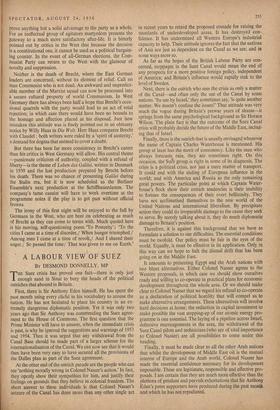A LABOUR VIEW OF SUEZ
BY DESMOND DONNELLY, MP THE Suez crisis has proved one fact—there is only just enough sand in Sinai to bury the heads of the political ostriches that abound in Britain.
First, there is Sir Anthony Eden himself. He has spent the past month using every cliché in his vocabulary to arouse the nation. He has not hesitated to place his country in an ex- tremely dangerous diplomatic position. Yet it was only two years ago that Sir Anthony was commending the Suez agree- ment to the House of Commons. The first question that the Prime Minister will have to answer, when the immediate crisis is past, is why he ignored the suggestions and warnings of 1953 and 1954. Then it was urged that any withdrawal from the Canal Base should be made part of a larger scheme for the internationalisation of the Canal. We can now see that it would then have been very easy to have secured all the provisions of the Dulles plan as part of the Suez agreement. in recent years to retard the proposed crusade for raising the standards of underdeveloped areas. It has destroyed con-, fidence. It has undermined all Western Europe's industrial capacity to help. Their attitude ignores the fact that the nations of Asia are just as dependent on the Canal as we are; and in some ways more so.
As far as the hopes of the British Labour Party are con- cerned, stoppages in the Suez Canal would mean the end of any prospects for a more positive foreign policy, independent of America; and Britain's influence would rapidly sink to the level of Sweden.
Next, there is the ostrich who sees the crisis as only a matter of the Canal—and often only the use of the Canal by some nations. 'Its use by Israel,' they sometimes say, 'is quite another matter. We mustn't confuse the issues!' That attitude was very much the vogue during Britain's prewar years of shame—it springs from the same psychological background as Sir Horace Wilson. The plain fact is that the outcome of the Suez Canal crisis will probably decide the future of the Middle East, includ- ing that of Israel.
Finally, there is the ostrich that is usually envisaged, whenever the name of Captain Charles Waterhouse is mentioned. His group at least has the merit of consistency. Like the man who always forecasts rain, they are sometimes right. On this occasion, the Suez group is right in some of its diagnosis. The crisis is a political crisis, not just a mere matter of transport. It could end with the ending of European influence in the world; and with America and Russia as the only remaining great powers. The particular point at which Captain Water- house's flock show their ostrich tendencies is their inability to foresee the consequences of their overt bellicosity. They have not acclimatised themselves to the new world of the United Nations and international liberalism. By precipitate action they could do irreparable damage to the cause they seek to serve. By merely talking about it, they do much diplomatic damage to Britain's position.
Therefore, it is against this background that we have to formulate a solution to our difficulties. The essential conditions must be twofold. Our policy must be fair in the eyes of the world. Equally, it must be effective in its application. Only in this way can we hope to halt the dismal drift that has been going on in the Middle East.
It amounts to presenting Egypt and the Arab nations with two blunt alternatives. Either Colonel Nasser agrees to the Western proposals, in which case we should show ourselves ready and willing to co-operate in practical plans for economic development throughout the whole area. Or we should make clear to Colonel Nasser that we regard his refusal to co-operate as a declaration of political hostility that will compel us to make alternative arrangements. These alternatives will involve hard decisions at home; the reduction in capital investment to make possible the vast stepping-up of our atomic energy pro- gramme is one essential. The laying of a pipeline across Israel, defensive rearrangements in the area, the withdrawal of the Suez Canal pilots and technicians (who are of vital importance to Colonel Nasser) are all possibilities to come under this heading.


























 Previous page
Previous page